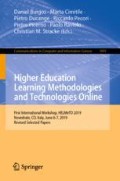Abstract
In recent years, long distance learning has become more and more popular. Web based technologies, that allow the sharing of information in real time, as well as the development of Learning Management Systems, provide the required technological support to implement long distance courses. However, long distance learning is characterized by a completely different relationship between teacher and student, in respect to the traditional teaching approach. It is then important to understand if this difference can affect the students learning outcomes. In this paper the comparison is presented between the summative assessment of two separated groups of students, attending an engineering drawing course, that is part of the curriculum for the bachelor degree in mechanical engineering. One group attended the course in a traditional form, while the second group attended the course in remote. The aim of the study is to verify if significant differences exist between the two groups of students, in terms of learning outcome. The identification of such differences is the premise to develop appropriated teaching strategies, aimed to overcome possible deficiencies related to the teaching approach.
Access this chapter
Tax calculation will be finalised at checkout
Purchases are for personal use only
References
Trentin, G., Olimpo, G.: La Telematica nella didattica: come e quando. Reviews in gastroenterological disorders (1993)
Repetto, M., Trentin, G.: Faculty Training for Web-Enhanced Learning. Nova Science Publishers Inc. (2011)
Trentin, G.: Mappe concettuali, flussi di conoscenza e sviluppo professionale continuo. Form@re 15(2), 04–18 (2015)
Álvarez-Caldas, C., Calvo, J.A., Quesada, A., Román, J.L.S.: Interactive application for technical drawing learning. Mech. Mach. Sci. 181–189 (2013). https://doi.org/10.1007/978-3-319-01836-2_20
Julià, C., Antolì, J.Ò.: Enhancing spatial ability and mechanical reasoning through a STEM course. Int. J. Technol. Des. Educ. 28(4), 957–983 (2017). https://doi.org/10.1007/s10798-017-9428-x
Sutton, K., Williams, A.: Spatial Cognition and Its Implications for Design. International Association of Societies of Design Research, Hong Kong (2007)
Villa, V., Motyl, B., Paderno, D., Baronio, G.: TDEG based framework and tools for innovation in teaching technical drawing: the example of LaMoo project. Comput. Appl. Eng. Educ. 26(5), 1293–1305 (2018). https://doi.org/10.1002/cae.22022
Paige, M., Fu, K.: Spatial demonstration tools for teaching geometric dimensioning and tolerancing (GD&T) to first-year undergraduate engineering students. In: 2017 ASEE Annual Conference and Exposition Proceedings (2017). https://doi.org/10.18260/1-2-28835
Hamza-Lup, F.G., Sopin, I.: Web-based 3D and haptic interactive environments for e-learning, simulation, and training. Web Inf. Syst. Technol. 349–360 (2009). https://doi.org/10.1007/978-3-642-01344-7_26
Anohina, A.: Analysis of the terminology used in the field of virtual learning. J. Educ. Technol. Soc. 8(3), 91–102 (2005)
Assante, D., Caforio, A., Sepe, R.: University-external world organizational interfaces and knowledge transfer models - the case of the International Telematic University UNINETTUNO and Telecom Italia, Conference Paper (2006)
Markin, P.B.: The comparative analysis of different online education and blended learning solutions in the non-OECD context. In: The Global Education Conference, 13–16 November 2016
Irons, A.: Enhancing Learning Through Formative Assessment and Feedback. Routledge, Abingdon (2008)
Author information
Authors and Affiliations
Corresponding author
Editor information
Editors and Affiliations
Rights and permissions
Copyright information
© 2019 Springer Nature Switzerland AG
About this paper
Cite this paper
Raffaeli, R., Cicconi, P., Mandorli, F. (2019). A Comparative Assessment of Learning Outcomes in Online vs Traditional Teaching of Engineering Drawing. In: Burgos, D., et al. Higher Education Learning Methodologies and Technologies Online. HELMeTO 2019. Communications in Computer and Information Science, vol 1091. Springer, Cham. https://doi.org/10.1007/978-3-030-31284-8_12
Download citation
DOI: https://doi.org/10.1007/978-3-030-31284-8_12
Published:
Publisher Name: Springer, Cham
Print ISBN: 978-3-030-31283-1
Online ISBN: 978-3-030-31284-8
eBook Packages: Computer ScienceComputer Science (R0)

